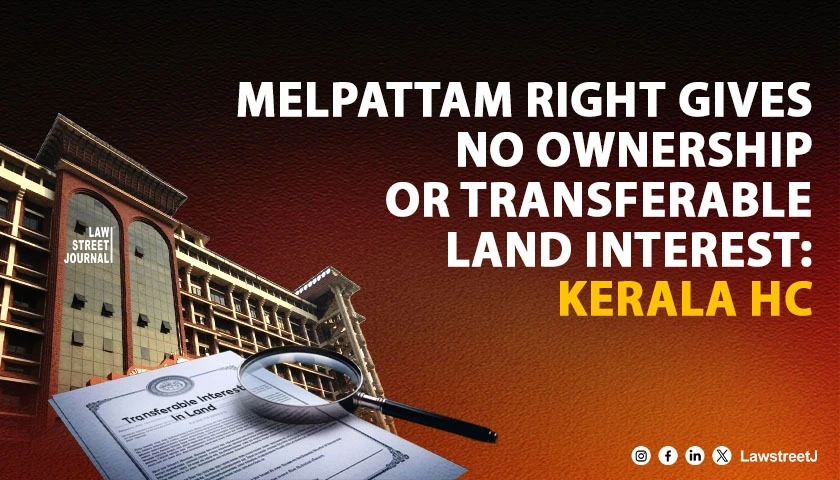Kerala: The Kerala High Court has reiterated that a melpattam arrangement, i.e. a traditional right to take usufructs from trees, does not create ownership or any transferable interest in the land itself.
A Division Bench comprising Justice Sathish Ninan and Justice P. Krishna Kumar delivered the judgment while dismissing an appeal challenging a preliminary decree for partition passed by the Sub Court, Vadakara.
The dispute arose concerning a family property originally owned by one Kadungon under a partition deed executed in 1911 and later bequeathed through a Will dated 30.08.2011. The plaintiffs sought partition and separate possession of their 5/6 share in the property.
The appellant–first defendant contended that the property was not partible, asserting exclusive ownership based on a melpattam right granted by Kadungon’s wife Narayani to her son-in-law Anandan, followed by subsequent transactions including a 1938 permission to construct a house (Ext. B3), a 1943 conveyance (Ext. B4), and a 1972 sale deed (Ext. B5) in his favour.
Rejecting the claim of exclusive ownership, the Court held that a melpattam is only a usufructuary right (a right to take benefits such as fruits or income from trees) and does not create any proprietary or possessory interest over the land. Citing Krishnan Nair v. Abdu [AIR 1965 Ker 39 (FB)], the Bench reiterated that a melpattam “is a lease of trees with no interest in the land, ordinarily enuring for one year.”
The Court observed, “The right conferred under a melpattam is only the right to take usufructs from the trees. There is no creation of interest over the land. The possession under the arrangement is limited for the purpose of taking usufructs.”
The Bench further clarified that under the Madras Marumakkathayam Act, any lease exceeding twelve years or having fixity of tenure required the written consent of the majority of adult members of the tarwad (joint family). Since no such consent was obtained, the alleged melpattam could not operate as a valid lease or confer proprietary rights.
Referring to subsequent documents, the Court held that Ext. B3 merely permitted construction of a house and sinking of a well; subject to surrender upon reimbursement of expenses; it did not create any inheritable or transferable right. Similarly, Ext. B4, which conveyed the melpattam right from Anandan to his wife Lakshmi (a co-sharer), and Ext. B5, by which Lakshmi conveyed her supposed share to the appellant, had no legal effect since an undivided member of a tarwad cannot alienate her share in the common property (Ammalu Amma v. Lakshmi Amma, 1966 KLT 32).
The Court observed that even assuming possession by the first defendant, there was no plea or proof of adverse possession or ouster, as the sale deed itself acknowledged the co-ownership of others.
Holding that the melpattam and permissive rights do not operate against the rights of other co-owners, the Division Bench concluded that the property was partible and upheld the preliminary decree for partition.
“The melpattam arrangement could not negate the rights of the other members of the family and did not create any interest over the land,” the Bench held.
Accordingly, the appeal was dismissed.
Case Title: Venugopal K. Veloth v. Mahilamani & Others




![Kerala HC Quashes 498A Dowry Harassment Case Against Live-In Partner, Citing Lack of Relative Status [Read Order]](/secure/uploads/2023/08/lj_5693_1057c042-1e57-4e27-8c9e-25af0ec38ec4.jpg)
![Watching porn on mobile: Kerala HC highlights importance of mother cooked meals, outdoor sports [Read Order]](/secure/uploads/2023/09/lj_9155_Parental_supervision_of_mobile_phone_usage.jpg)
![Lakshadweep MP Mohammed Faizal Disqualified from Lok Sabha After Conviction Suspension Plea Rejected by Kerala High Court [Read Notice]](/secure/uploads/2023/10/lj_9640_87b5fd97-0e05-4ff8-9a99-3be1e4446192.jpg)






